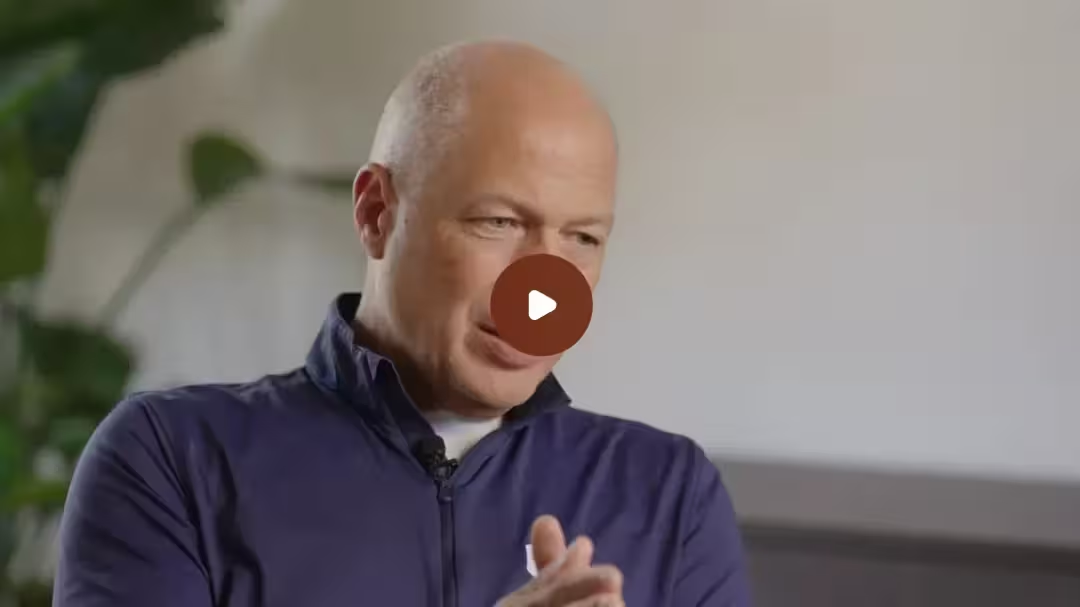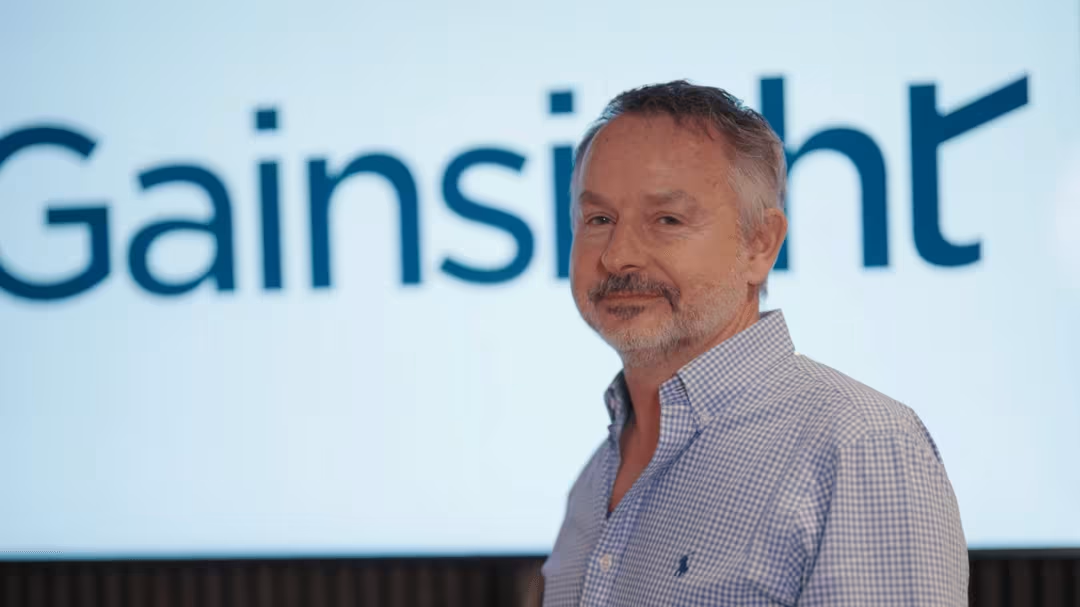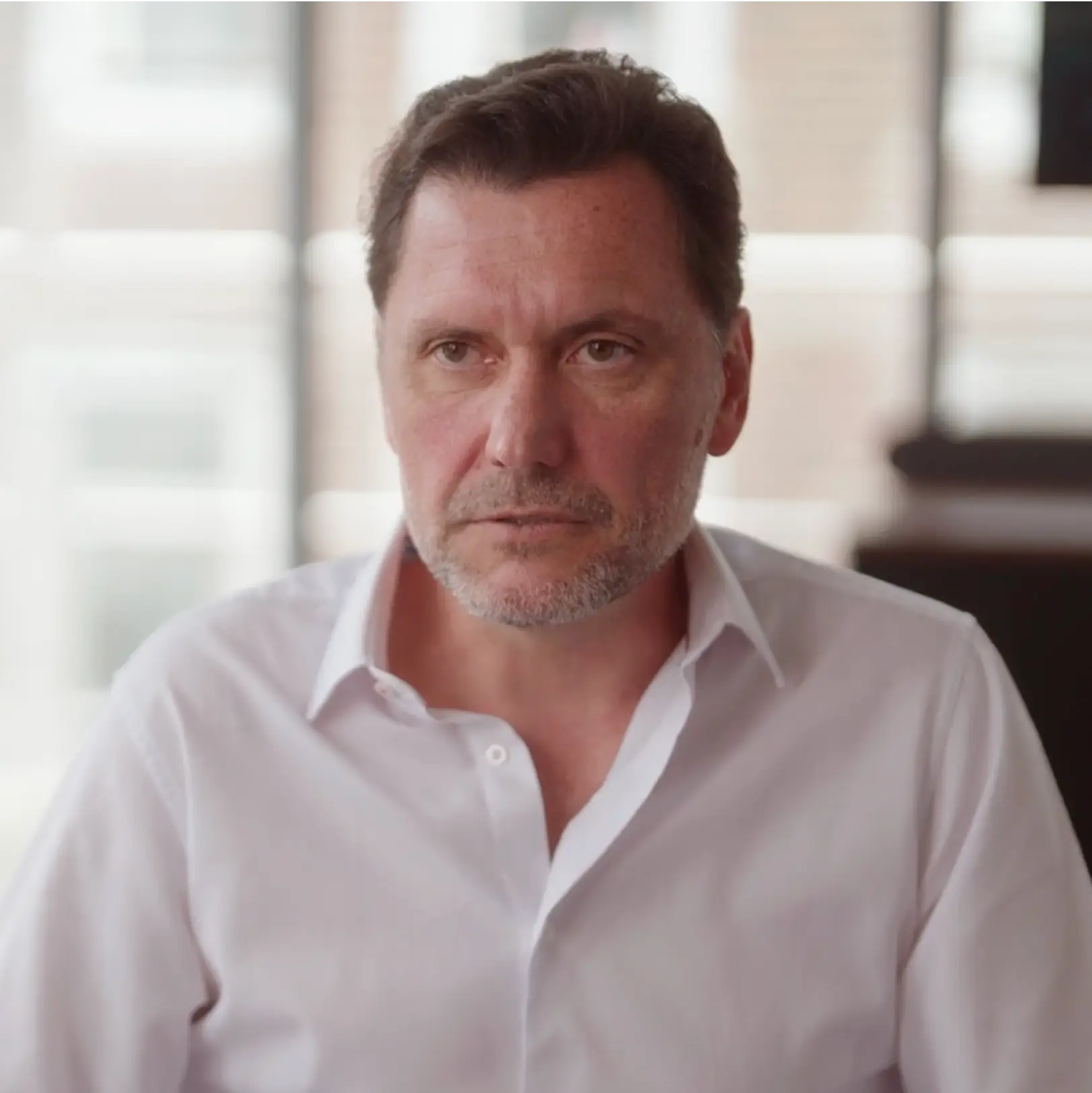The Interview
Kluster's Take
Tom spoke with Sameer Bhandari, Vice President of Sales at FOSSA. He describes his open-minded approach.
Sameer tells us that wherever you are in your sales career, there’s something you can learn. Another tenet is never work for someone you can't learn from. He believes that it’s key for salespeople to demonstrate curiosity. Everyone develops their own style over a period of time. Curiosity is present from an early stage and never goes away.
Sameer coaches teams through the big changes that need to happen as you scale. As a leader, you need to be able to trust and delegate. Yet, you must create a playbook for situations. In the playbook, there is guidance on the sales process and what sales enablement could look like. Although it’s up to the team to implement them as they see fit. Sameer keeps an open mind, expecting the unexpected.
Transcription
That essentially means that no matter where you are in your sales career, there's learning to be had. If you keep your eyes and ears open.
Hey. So today we're joined by Samir Bandari. Uh, he's a VP of sales at bossa. Uh, the theme is going to be about how we enter sales folks into the profession and everything around that. So welcome. Thanks, Tom. Pleasure to be here. Yeah. Awesome. So the first question we'll actually discuss right now, mirrors is actually one about you.
Um, so what is your sales leadership philosophies and how has your life impacted your approach? Sure. That's a, it's a great place to start. So, uh, I genuinely live by three philosophies that have helped me kind of navigate my career and get to the point where I am today. Um, one is that the, the learning never stops.
Um, and that essentially means that no matter where you are in your sales career, um, you're, you're, there's, there's learning to be had. If you keep your eyes and ears open. Um, the second philosophy I've always lived by is I've never worked for anyone that I haven't been able to. Learn from, or see, uh, a mentor or see him or her as a mentor.
And I've really been fortunate to have some of some just phenomenal leaders that I've worked for through my career. Um, and the third thing is that no two sales are able to sell. And what I mean by that is the fact that, uh, you know, salespeople often get into this mode when you've had a good year or a good quarter or a few good quarters, a few good years behind you that you feel like you've pretty much seen it all.
And trust me, you haven't. Um, I've been in sales, leadership roles in three different organizations. And, um, it's, it's been a brand new journey almost. I feel like I feel like a undergrad myself, every time I, I switched jobs or picked up a new role. So yeah, those are, those are my three philosophies that I live by.
That's fantastic. And it sounds like the uniting string there, all of those as one of an open mindset and learning whether that be from your mentor, so not expect or expecting that the unexpected. Yeah. And, and, you know, I'll, I'll even flip that from the perspective that when people deal with salespeople, um, I ask a lot of my friends, a lot of my colleagues, um, when I, when I, you know, are working with them on pursuits, et cetera, or guiding them or mentoring them through pursuits, um, is, you know, what's the first reaction that.
Um, when, when people know that they're going to be talking to a salesperson and, you know, it's, it's between an eye roll and a, can we, can we make this call go any faster? Um, and the reason for that is that I think there's just this kind of fatigue in dealing with salespeople because customers know. Uh, what they want.
Uh, the customers today are very educated. Um, and it's irrespective of what field. So I think if you, if you play the role of a consultant, or if you play the role of a, a partner, you're more than likely to land a sale versus come in there and sell what you have. And sometimes that means to say, we're not the best fit.
Um, I've done that in my career. Plenty of times where, you know, the, the immediate sale is tempting, but the loss of reputation and value. Um, I think is, is far greater, uh, uh, Arista date then, you know, foregoing a sale for now, but yeah, absolutely. Yeah. I'm glad you bring up the perceptions of sales folks.
Um, because this is one that definitely impacts people thinking about getting into the role or just before they get in. Now, if you're a young sales rep, you have your quota, maybe sometimes you mess because plenty. Do you feel the pressure of that target? How does this interact with this site, this confidence that we have to sometimes say no, like how do we get to the position where we can sometimes decline?
Um, how can we overcome the pressure of the target to behave in the right way, I suppose, as a salesperson? Yeah, I think that's a good question. Um, I think the, an effective salesperson is one who continues to. Ask him or himself or herself, the question, which is if I make the sale today, can I go back to this person or this prospect to this customer in six months to a year?
And that person will still be willing to talk to me for an upsell or a future self. And if the answer to that question is yes. Right then that's the right sale to make. If the answer to that question is, you know, that depends, you know, did I, did I forward sell too much to that forward, lean, lean forward too much into the sale that I sell features that were not really there, but were coming down the pike or so on and so forth.
So that's, that's kind of my yard state for, or that would be my best advice to kind of budding salespeople who are tempted to meet numbers and meet commissions, uh, and meet goals. Um, is ask yourself the question. Would you be able to go back to this customer in six months to a year and would they be willing to take your call?
And if the answer is yes, you know, you're, you're in the right business and you're making the right sale, great answer. And it makes a ton of sense from a personal perspective. If we also applied that to a revenue leader, like a VP of sales or CRO, um, would you be happy or very hypothetical here understand that, but you know, would you be more or less happy with the rep missing target, but making sales that didn't churn and that had upsale and that were the right sale versus perhaps beating, meeting target with the opposite of that effect.
Yeah. And, and, you know, I'll be fairly open about this. The answer is yes, I choose the former. Any day of the week, uh, over the ladder. Um, and, and quite honestly, I think most mature sales programs have this term, which is not a favorite in salespeople called clawbacks. Uh, that's why we put them there, which is if you made a sale, which was, you know, just to push a few dollars through, right.
And the customer finds no value. I mean, that damage. It's permanent. Um, and to overcome that damage, it's going to be a combination of getting your execs involved or getting the C-suite involved or having to discount heavily, uh, to avoid kind of loss of reputation, so on and so forth. And it's not so much about the upper hand or the lower hand, or who has the upper hand in the deal.
I think it's more about, you know, every sale is a trust building process. Um, and if you're not building that trust every step of the way, um, yeah, I take the form of rep any deal. Okay, this is great. So distilling from this conversation smear, we like sales folks who are curious, who stay curious and they act with high levels of integrity.
So I'm interested to hear for you as a leader, um, how this applies to your recruitment process. And actually, even if we went before our recruitment process to people thinking about getting into sales, what that means for those people. Yeah. And, and this is, this is one, that's always been a little bit controversial because I think recruitment comes down to, um, you know, what a leader is looking for.
And, and I, I network a fair bit with sales leaders in my space and all of us tend to look for different things. Right. Um, recruitment for me, Dom boils down to curiosity. Uh, especially when I'm looking for a first timer or I'm looking for a younger kind of sales, uh, personnel to recruit. And what I mean by curiosity is who's the one asking the questions.
Right. Um, and I'm always a big fan of when I, when I interview people and I've built teams, um, I think over the last 10, 12 years, um, I've always favored the profile of person that has more questions than I have. Um, on the interview and I've always favored the profile of person that lends himself or herself to a lot of curiosity.
If I, if I'm able to walk away from the interview with this person who is actually here to learn. Right. Especially when they're early on in their career and they don't have too much history in the sales process. That's kind of like the number one thing that I'm looking for. Look, you know, experience. I always, uh, I always go by a quote that I, um, that I, that I repeat very often, which is the, the only stupid question is the one you don't ask.
Right. Um, and, and if, if people in their early years show that hunger for learning curiosity, um, I think that's right profile. Things like product things like deal-making things like all of those can, can be learned. It can be taught over a period of time. Everyone develops their own style over a period of time.
But curiosity, if it's there from the early stage and the hunger for learning is there from the early stage, um, that never goes away. Yeah. Yeah. So we're touching on vulnerability there and sales. I'm interested to hear smear how we can encourage a culture where being vulnerable is okay on Salesforce.
Yeah. Um, that, that's, that's a good question in the sense that I think most salespeople shy away from being vulnerable, but I think vulnerability also shows, uh, imperfection. Um, and I think in today's day and age, especially where a lot of the selling is remote. Um, I think it's become even more, more important to be very upfront with what vulnerability is.
I'll give you. I'll give you two example without naming the customer. Um, I was on a pricing call with a team member yesterday, right? We, this is an existing customer we're going in for an upsell. Um, you know, it's important for us as a company. We're a very early stage company. Um, and they truly see value in our product, right.
We presented based on an earlier call, we presented a couple of pricing options, um, and like all good customers. They came back and said too expensive. Um, and, uh, you know, part of the discussion that we had post them telling us that was about the fact that look at the stage of the company that we're at, we're hungrier, right.
We're willing to learn. Right. And we're willing to kind of grow our product with them. So to say, you're not perfect. Right, or this is a take it or leave it, I think is, is a way of showing vulnerability. And, and what we came away from that call with, which was very encouraging was there were, you know, we threw out a third option and we said, look, what if we did option X?
And they were like, okay, that kind of makes sense. So let's put pen to paper and let's reconvene. So the point I'm making is it's is it's completely okay to. Be open, be vulnerable and be able to say I'm not perfect. I mean, if, if, imagine this, if, if by nature we will not vulnerable that doesn't only impact your professional life, that starts to impact your personal life as well.
I mean, who in their personal life ever went back and said, I've learned everything I could, right. Or I, I have nothing more, no one can teach me anything. Right. Um, even at my stage today, I consider myself vulnerable. I consider myself honorable because there are people on my team that know the product better than I do.
There's people on my team that probably can, can be someday a better leader than I am today. And to be able to be open to that and accept that and absorb that from other people and be open about it, I think has, has got me to a point in my career where the one thing my teams have for me is respect. And respect brings collaboration, respect brings partnerships.
So you work a lot better. Um, in a nutshell, um, I'd say the best way to coach, uh, or, or the best advice I can give for vulnerability is the fact that before you're going into a big goal, right, uh, that you feel is going to make or break it for you, um, prepare a list of things that, you know, in a list of things you don't know and be prepared to talk about them.
Um, I think that's the best coaching I can. Like, I like producing a list of things you don't know. I think reps are often thinking about their talk tracks areas they're going to demo, but maybe not the things they're not sure about yet. Yeah. Yeah. Um, so it sounds like for you, Samir vulnerability is actually framed as a positive thing because it's something we can either get better at or a way we can form a more meaningful relationship with.
Yes. And, and you're, you're touching on this, um, kind of via different questions to him, but you view, you've used the word relationship a few times now. That's what sales is. If you're not establishing relationships, you're not selling, it's easy to sell and move on. Right. But the fact that I went in and met a customer of mine, who was a customer in a previous company, just, you know, a week ago, um, is, is Testament to the relationships we build in the sales process.
Um, and of course they'll do business with you. If the new company you join or things like that, there's a difference that we networking and building relationships, right? Networking is like-minded professionals, uh, learning, absorbing so on and so forth. Building relationships in my mind is making sure that the people that you've built those relationships.
Um, our trusting you, uh, our trusted partners who would go out on a limb and do business with you, just because they know you, they trust you. And they know you work the right way and, and, and follow a set of ethics. I think a lot of times sales people confuse networking activities with building relationships.
There they're two very different things. I network for completely different reasons, and I've got relationships with completely different reasons. Yeah. Yeah, that's a good dissection. Um, I think we have a really clear picture of what a good sales culture can look like. So the question might come to, how does this change as things scale where a VP right now, and perhaps our team is a bit smaller.
We have direct oversight over most of our apps and how they work as we get bigger. And perhaps we want to encourage the leadership from within. We lose control to a degree. Um, so how does nurturing leadership values and the upcoming leaders look basically, you know, how do we make sure these aren't lost on, on next level of management?
If you were expecting a magical answer, I'm about to disappoint you, but, but it's, uh, it's actually comes down to you. You, you look at any sports, right? Um, a player coach. Right. It brings a different perspective to a game versus a coach. That's never played the game, but it's very good at strategy. I believe sales is a player coach kind of arena, right?
As a player coach profession, and the best, the, the, the big changes that need to happen as you scale. Um, and I've been part of two companies in the past that started out privately. One of them went public, so we scaled tremendously. Um, and the other one. You know, it was in a hyper-growth phase and then hypergrowth, uh, industry.
And I was spent about three and a half years with them in this scale tremendously. During that time, the, the thing that changes is you've got to be able to, as a leader, um, be able to trust and delegate, but at the same time, Um, you've gotta be able to come up with a playbook for situations. I'll give you an example, um, with, with, with fossa, uh, the company that I'm currently with and excited for, for the journey we're putting together a sales playbook, because we're anticipating scaling next year, right?
Um, in that playbook are, is, is a ton of guides and processes to what the sales process looks like and what sales enablement could look like. But at the end of the day, I have to trust my team. To take pieces of that playbook and implement them as they see fit. Uh, my job eventually is to turn into a, a coach, which is I can guide the sales process.
I can opine on the sales process. Uh, we do our weekly meetings on Mondays, right where we talk to our deals and outbound campaigns and so on and so forth. What that shows me or what that shows them is that I have oversight. Of the program and what I'm doing, but I'm not, I'm not pulling the puppet strings, right.
I'm not the puppet master. Uh, they're they're masters of their own destiny. And, and I almost kind of tend to disagree with the, uh, the fact that it companies that are in early stage that, you know, sales leaders want to have a lot of control. Um, if you're, if you're like me, I I'd like, I like to give up control from the early days.
Cause that becomes your culture. And then the change is not, it's not difficult. Right. Um, and when it also works great during recruitment, when, um, you know, early stage companies, you have whoever you're trying to recruit, talk to your existing team and they say, look, it's a pretty decentralized culture. We, we run our own playbooks and we get, you know, we get guidance when we.
Right, but we don't, there's a difference again between guidance and interference. Right. Um, so I, I think from my perspective, personally, I think decentralization or delegation, um, is a, uh, is, is an early stage street as well. You don't have to wait to scale to do that. I think the only thing that changes as you scale is, uh, your processes, um, are a must, um, and data tends to get more and more complex.
So if you have a good understanding of the business and you have a good understanding of data that the business throws up, I think scaling becomes a lot easier. Yeah, that's fantastic. Yeah, you're right. Let's not make assumptions about what the typical culture and the small, medium, large scale business looks like brilliance in that.
Cool. So final question. If you're in a room full of the best sales leaders, or even leaders in general, to be honest, the best ones to ever do it, what would you ask them?
I'd asked them what's next. Um, cause I think it's a question that I've grappled with, right? Um, you continue to build sales organizations, right? Um, what comes next for sales? Cause that's the answer I'm searching for. And I don't mean my next job. I just mean what's the, what's the, what's the next level of evolution once you've been recognized or tagged as a successful sales leader.
Um, and I don't think any of us have really figured out the answers. Um, but you know, I, I'd also, uh, I'll, I'll take the Liberty of adding kind of one more thought is, you know, are you a coach or are you. Um, that's that's the question I want to ask is, cause I look for, I think you, you figured out a theme by now.
I I'm guessing, but I look for subtle differences in personalities and the way people run things. Um, I tend to run things as a coach, a lot of people, a coach who can step up to a leader. Um, which one's better, of course, that can step up to a leader or a leader that can, they can step up to being a coach.
Um, but yeah, I think I would definitely ask is successful a room full of successful sales leaders about kind of what's next for us. Like where do we go from here? What's that next big thing that we can, uh, that we can contribute to and give back? Cause I'm a, I'm a fan of giving back. Nope. No point being successful.
If you can't give up. That's a good point that one's finished on. Um, I wonder if it's something about sales, where you chase targets, you meet targets, you chase bigger targets and you become a lead X, Y Zed one. If it becomes hardwired to sales folks to we think about what next can I do? Absolutely.
Absolutely. I think the, the, you know, to put a finer point on it, Tom, I think sales is like any other. Right. Um, it's not temporary. It's it's it gives you a high, the highest array high, the lows are very low. Um, and just like, you know, an artist or the writer can come up with like an artist block or a writer's block.
Uh, salespeople have blocks that they find mental blocks that they find difficult to overcome every now and then too. I mean, it, a couple of deals going south can have a devastating impact on a, on an up-and-comer. Right. And that's the time it's, it's up to people like us to kind of coach them through.
Right. To be able to kind of say, you know what, it's okay. Like, guess what? In my 15 year career I've lost a ton of deals. Right. But I won more than I lost. Because again, everything comes down to kind of like a sports analogy lately. But you know, at the end of the day, at the end of the season, it's where you made it is what matters, right?
How many losses you had on the way. But if you still came out on top, those losses were well worth it. As long as you learn from them.


.svg)
.svg)
.svg)
.svg)










